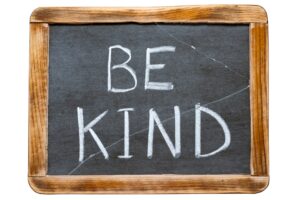
In today’s fast-paced business world, kindness isn’t a strategic priority for most organizations. In fact, it is often considered a weakness. After all, nice guys finish last. Or do they? International leaders such as Mother Theresa, Princess Diana, Mahatma Gandi, Martin Luther King, Jr., and Nelson Mandela are recognized for inspiring millions and changing the world with kindness. When business leaders recognize that kindness is not only a virtue but also a strategic advantage, they can elevate their employees and organizations to new heights.
Kindness is an often-undervalued skill in top performers. From top executives to entry-level team members, genuine kindness not only has the power to transform company culture and drive success, but it also enriches the individual’s work experience. At every level, genuinely kind people help businesses succeed, and they also feel a sense of personal fulfillment and satisfaction.
Kindness Drives Success
A recent study found that three-quarters of respondents believe mental health should be prioritized in the workplace, and they actively seek employers who embrace policies of kindness. This not only drives success but also ensures the well-being of the workforce. Nearly 90 percent of workers say mental health and kindness should be workplace priorities. Organizations are embracing the concept with industry leaders like Ulta Beauty, Google, Nestle, and the NBA creating workplaces where kindness reigns supreme, fostering a sense of care and reassurance.
Kindness is not just a soft skill, but a catalyst for innovation. When employees feel safe and supported, they are more likely to share their ideas and take risks. Research has shown that compassion enhances employee engagement, improves performance, and strengthens decision-making capabilities. For example, at Google, the “20 percent time” policy, which allows employees to spend one-fifth of their work time on personal projects, is a direct result of a culture of kindness and trust. This approach fosters a culture of open communication where diverse perspectives are not only welcomed but respected. This, in turn, encourages teams to think outside the box, leading to new solutions, creative breakthroughs, and fresh possibilities. By valuing compassion, and empathy, employers can unlock the full potential of their team members and harness the power of innovation.
Kindness also creates a solid foundation for connection and trust. When leaders and team members treat each other kindly, it fosters a sense of confidence and belonging. Employees feel valued and appreciated, leading to increased loyalty and productivity. Genuine acts of kindness, such as offering a helping hand or expressing gratitude, build strong relationships that solidify the foundation for collaboration and teamwork.
Kind vs. Nice
It’s important to understand that kindness goes beyond merely being nice. True kindness is intentional while being nice can be passive. A kind person goes out of their way to show care and compassion to others. It’s an active choice, not just a personality trait.
For example, being nice is smiling and saying hello when you pass someone in the office. On the other hand, being kind is asking how their day is going and actively listening to the response. Being nice is holding the door for someone behind you. Being kind is seeing someone struggling to open a door with their hands full and stepping in to help.
Kindness requires empathy, self-awareness, and deliberate, intentional action. It takes effort to practice daily kindness, but that effort speaks volumes and creates a ripple effect throughout workplace communities.
A Kind Culture

When former Prime Minister of New Zealand Jacinda Ardern resigned, she was asked what she wanted people to remember about her leadership. She said she wished for her legacy will be “a someone who always tried to be kind.” Arden’s “politics of kindness” resonated around the globe. “If we focus only on being seen to be the strongest, most powerful person in the room,…we lose what we’re meant to be here for,” she said. “I’m proudly focused on empathy, because you can be both empathetic and strong.
A culture of kindness leads to lower turnover, higher employee satisfaction, and better business outcomes—a win for individuals, teams, and the entire organization. Small acts of kindness compound over time and signal what behaviors the company expects and values. Whether it’s starting meetings by having everyone share a “win” from their week, sending handwritten notes of appreciation, celebrating work anniversaries, supporting employees during difficult personal times, or implementing peer recognition programs, leaders can weave kindness into company culture, steadily transforming it.
Kindness is a scientifically proven accelerator of organizational success. In today’s global and fast-paced world, compassion is not merely a “nice to have” attribute. It’s an evidence-based skill that is essential to effective leadership and productive teams.

